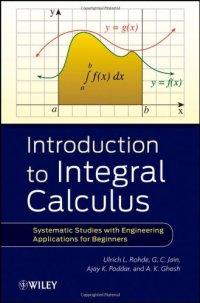
Ebook: Introduction to Integral Calculus: Systematic Studies with Engineering Applications for Beginners
I ntegration is an important function of calculus, and Introduction to Integral Calculus combines fundamental concepts with scientific problems to develop intuition and skills for solving mathematical problems related to engineering and the physical sciences. The authors provide a solid introduction to integral calculus and feature applications of integration, solutions of differential equations, and evaluation methods. With logical organization coupled with clear, simple explanations, the authors reinforce new concepts to progressively build skills and knowledge, and numerous real-world examples as well as intriguing applications help readers to better understand the connections between the theory of calculus and practical problem solving.
The first six chapters address the prerequisites needed to understand the principles of integral calculus and explore such topics as anti-derivatives, methods of converting integrals into standard form, and the concept of area. Next, the authors review numerous methods and applications of integral calculus, including:
Mastering and applying the first and second fundamental theorems of calculus to compute definite integrals
Defining the natural logarithmic function using calculus
Evaluating definite integrals
Calculating plane areas bounded by curves
Applying basic concepts of differential equations to solve ordinary differential equations
With this book as their guide, readers quickly learn to solve a broad range of current problems throughout the physical sciences and engineering that can only be solved with calculus. Examples throughout provide practical guidance, and practice problems and exercises allow for further development and fine-tuning of various calculus skills. Introduction to Integral Calculus is an excellent book for upper-undergraduate calculus courses and is also an ideal reference for students and professionals who would like to gain a further understanding of the use of calculus to solve problems in a simplified manner.